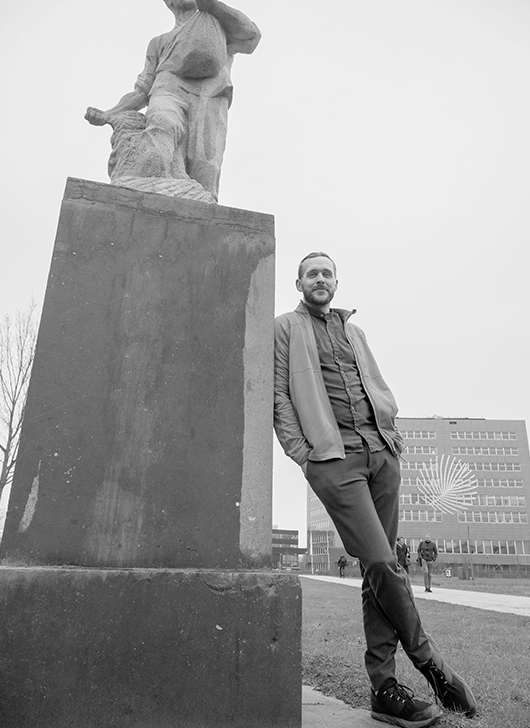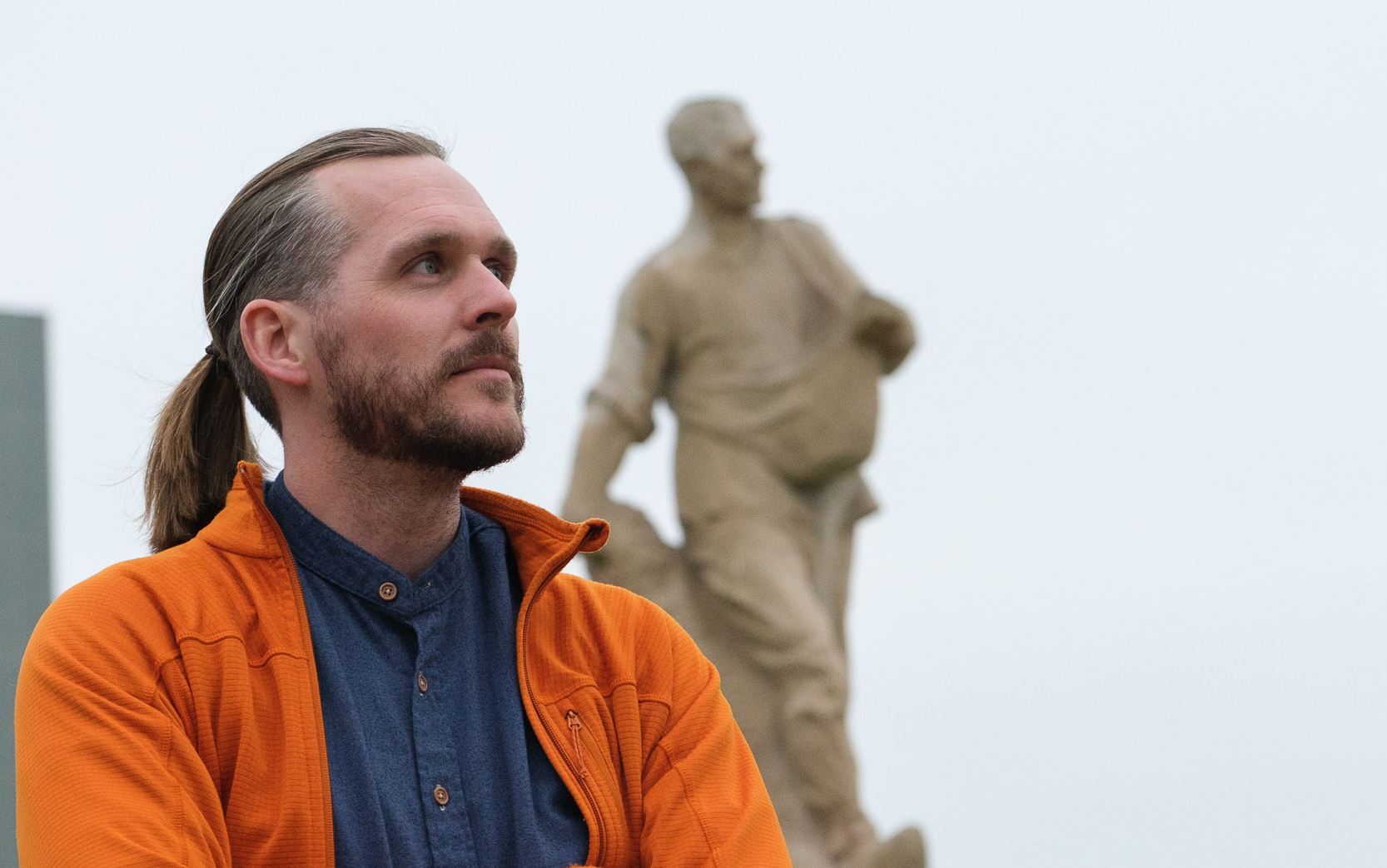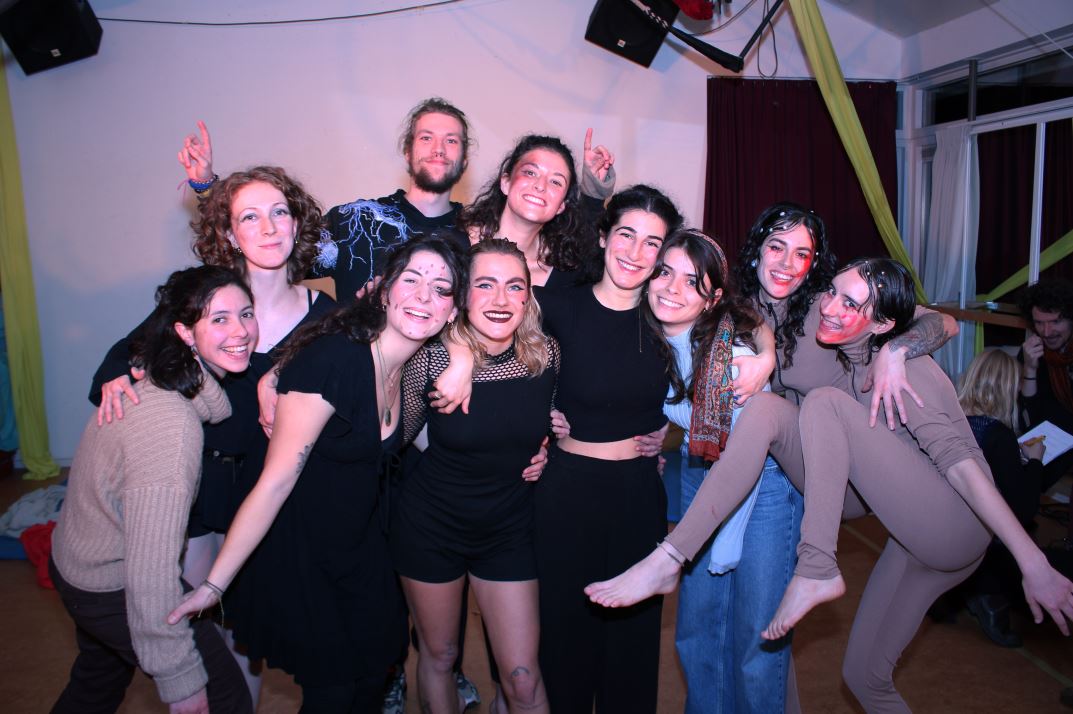Joost Baars is a teacher and an optimist. The statue of The Sower on campus inspired him to write the poem that accompanies this story. He explains why.
Joost Baars is a poet with several volumes of verse to his name. But that is the Leiden literary scholar Joost Baars. Wageningen’s Joost Baars teaches plant breeding. But he too occasionally puts a creative pen to paper. After a tough long-distance run, for example, or, in the case of his poem about The Sower, during a performance by Syrian musicians in Impuls. But no, he has no ambitions to become an established poet. ‘Though I am looking for my voice. Writing is a nice way of expressing your thoughts. If you do it well, you reach a lot of people.’
Does that voice have something to say?
‘Yes, I think so. I am a seeker and a thinker. I’m not aiming to become another Joost Baars the poet, but my whole life I’ve felt the need to express myself. And I’m trying to find the right form for that. Trying is learning, says my five-year-old daughter. That’s what I’m doing here. I have an open mind and I ask questions. And I’m very optimistic. That’s where this poem comes from.’
Aren’t the other WUR folks around you open-minded?
‘There are a lot of experts working at WUR who know so much about their subject that they have developed a closed mind. They know exactly how things are and they are so convinced they are right that they don’t ask any big questions anymore. The heavy work pressure doesn’t leave room for doubts, exploration and posing philosophical questions. That distances them from the people who are just starting out. I am keen to be a beginner, someone who asks questions. And I wish our students the same.’
Does our education system suppress that kind of open mind in students?
‘I don’t see much discussion in our education. Someone tells a story but no questions are asked. The personality type I see a lot in WUR only speaks if they are sure about what they’re saying. Whereas I want to ask questions, to dare to entertain doubts and to change my mind if my opinion turns out to be wrong. I form my opinion by expressing it and assessing the responses I get. That’s not what our students here in Plant Sciences are taught. We learn to conduct a debate and to identify the counterarguments but not to engage in real dialogue, in which you learn to see each other’s points of view. If we stand opposite each other, your 6 is my 9. Yet we’re looking at the same thing.’
The Sower in the poem – is that you, actually?
‘Yes, of course it’s about me. It came to me when I was thinking about who I am, what I do, and how I look at education. I am someone who likes to sow. I have lots of ideas, which I send up like trial balloons. Quite often, you don’t get the response you were hoping for, which is fine. But if you do it properly and a seed lands on the right field, something good can come of it.’

Does something need to change in order to prepare that ‘field’, the students, better?
‘We rarely ask students what they want to learn. Students sign up for a course and the learning goals set for it, but there’s no discussion about those goals. As a teacher, I want to be a guide who takes students along on a learning journey. I am keen to hear what the students want to learn. In an ideal world, I would discuss that with every student individually. The sooner you take control of your own goals, the better prepared you are to do that in your work after graduating too.’
The sower in the poem is optimistic. Are you?
‘Certainly. I think it’s our moral obligation to be optimistic. Optimism breeds hope and without hope, you might as well do nothing. A lot of people suffer from burnouts and depression. They are all people who have lost hope. I’ve been through that phase in my life as well, but now I’m in a phase of drive and optimism. The time is ripe for that too. There is so much happening in the world that it’s easier than ever to get things moving. The fantastic thing about Wageningen is that there are so many international people living here. Wageningen is a global city. There are so many points of view here that it’s easy to think bigger than just Wageningen. I like to dream big and start small. WUR’s big mission will be achieved with small steps. I get satisfaction from small steps. That is how an optimist keeps going.’
The sower
The sower is optimistic
The land prepared
The soil worked
Nutrition added
The time has come to sow
The seeds have been picked
The sower is optimistic
Lets go of the seeds
Scatters them openhandedly
Accepts the results as they come
Trusts the work that has been done
The sower hopes
The sower is optimistic
About the weather
About the sun
About the rain
About the resilience of the crop
About the plasticity of plant
The sower is optimistic
The seeds will germinate
The plants will grow
Weeds the unwanted
The yield will come
Without hope no food
The sower is optimistic
Has hope
Trusts
Accepts
Feast or famine
The sower lets go
The sower is optimistic

 Joost Baars. Photo Guy Ackermans
Joost Baars. Photo Guy Ackermans 

